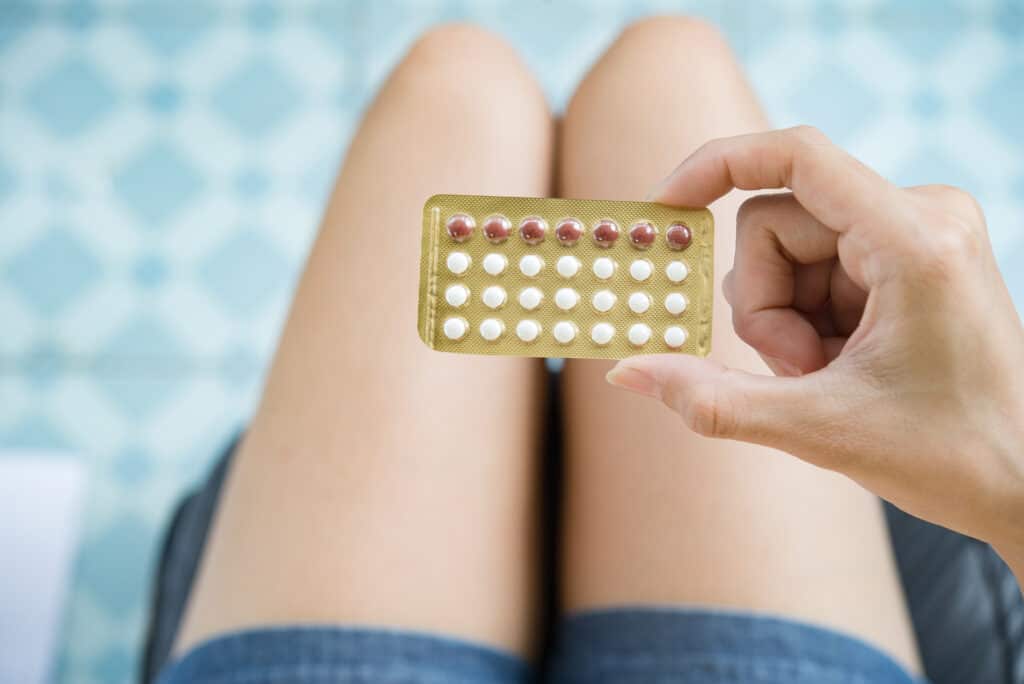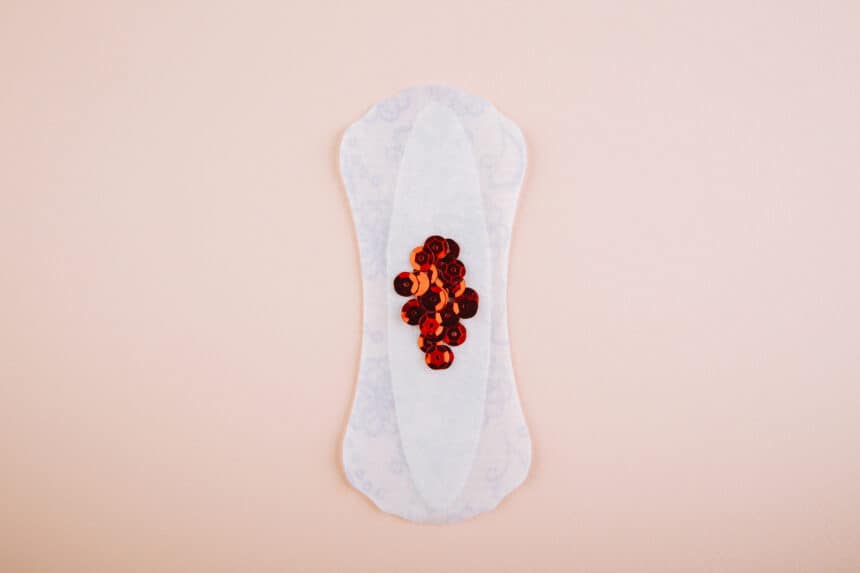4 Causes for a Watery Period Blood & What You Can Do About It
When it comes to period talk, length and regularity are often the focus of the conversation. But what about the consistency of your period? No, I’m not talking about the frequency of your period. I’m talking about the texture and thickness of the blood.
For some women, their standard period suddenly turns into a watery mess. What causes this consistency change, and are there any treatment options available?
What is a Watery Period?
Watery period blood is exactly what it sounds like – blood that’s light in color, thin and watery.
Women who experience this will often find that they soak their sanitary pads quickly, and in most cases, there are no blood clots expelled. Leaking may also be a problem.
Simply put, the menstrual blood looks like it’s been diluted in water.
4 Causes for Watery Blood Flow
What does watery blood flow blood mean?
Many things can make your period thinner or lighter than usual. Some of those causes are nothing to be concerned about, while other cases require immediate assistance from your health care provider because they pose a health risk.
Post-Pregnancy Periods
If you’ve recently given birth, your period may be unpredictable and “abnormal” for the first few months. It’s common for periods to be thin and watery or lighter than usual as your body recovers from the pregnancy and delivery.
Still, if your period is wonky after giving birth, talk to your doctor to make sure there’s no underlying medical condition to blame. It is vital to track the changes that occur in your body after pregnancy. Things like the menstrual cycle, blood clots, and estrogen levels are changes to follow closely to ensure no post-pregnancy complications.
Lighter Period
In some cases, lighter menstrual blood is nothing to be concerned about, especially if there is no pain associated with it.
Thin, bright red blood period blood is new blood that’s been prevented from clotting. Sometimes, fresh blood is so light and thin that it can look like you’re having thin period blood when mixed with cervical discharge.
If you’ve just started menstruating, your cycle may be lighter than usual. Every woman and every cycle is different.
Pregnancy

If you’re asking yourself, “why is my period watery?” pregnancy may not be the first answer that comes to mind. Isn’t your period supposed to stop when you’re pregnant?
Yes, but light spotting is common very early in a pregnancy.
Many women also experience clear vaginal discharge during pregnancy. If the discharge mixes with blood from spotting, it may seem like you have a watery blood flow.
Light blood or spotting early on in pregnancy can be a sign of:
- Implantation – When the fertilized egg attaches itself to the uterine wall.
- Irritation in the Cervix – Caused by a vaginal exam or sex.
A test can confirm whether you’re having thin period blood or if your symptoms are signs of early pregnancy.
If the bleeding continues for more than a day, it’s likely your period and not a pregnancy symptom. If you have confirmed pregnancy and the bleeding continues, see your ob-gyn right away to find the cause of the bleeding. For some women, this may be a sign of miscarriage or deficient estrogen levels.
Imbalanced Estrogen Levels
Hormonal disbalances cause all changes in the body. Data shows that women with low estrogen are more likely to get a uterine fibroid or PCOS and have irregular cycles or lose their cycle completely.
During pregnancy, estrogen grows and is what stops your period from coming each month. If you are making unhealthy lifestyle and food choices at this time, you may disrupt the body’s normal processes and cause havoc on your health. Higher levels of this hormone will also cause lighter and thinner bleeding during the first few weeks of pregnancy, which is nothing to worry about.
On the other hand, if a woman isn’t pregnant and is experiencing a lighter period, then it means that her estrogen levels are abnormally low, and the uterus cannot produce a regular period. Apart from all the medical products your doctor might prescribe to stabilize your hormones, you should change the way you eat and start making healthier life choices overall.
Labor Signs
If you’re pregnant and experiencing a watery period just days or weeks before your due date, it may be a sign that you’re about to go into labor.
Many women experience short, thin period blood in light color when the mucus plug comes out just before labor begins. In some cases, the mucus plug fluid can mix with amniotic liquid or leucorrhea and give the appearance of a thin blood period.
This watery blood will only last a few minutes or hours – not the entire length of typical periods.
If you’re in the later stages of your pregnancy and you’re experiencing thin periods and uterus pain, call your ob-gyn to find out if your symptoms are a sign of labor, issues with the uterus, or maybe other health conditions.
Birth Control

If you have just started taking birth control, your body may be responding to it by producing a lighter blood flow in the first few months. After this initial period, your estrogen level changes, and the uterus and body, in general, will get used to it.
This is when your menstrual blood becomes thicker or more mucus-y, and you may start noticing some blood clot pieces. The color of the menstrual blood will also darken and start resembling regular periods that you used to have before taking birth control.
All these changes are entirely normal and should be expected, especially if your cycles prior were irregular.
Other Causes
Other health conditions may cause changes in your flow. For some women, these conditions will result in heavier menstruation, while some will have lighter and thinner periods.
- Cervical cancer or uterine cancer can cause you to love your period. In some women, this may cause a heavier-than-normal flow. These cancers are mostly diagnosed post-menopause. Women of reproductive age are less likely to get them.
- Endometriosis causes the lining of your uterus to shed more for a specific time but then you might get a period where you barely have any color, and it looks more like water than blood.
- Adenomyosis is when the tissue that’s supposed to line your uterus has grown into the uterine wall. This also may disrupt the regular cycles and lower the density of the blood.
- IUDs come with a side effect of heavy bleeding or lighter than usual bleeding. Different women will react to it differently in the first year of use.
- Polyps are noncancerous growths in the lining of your uterus. These will cause periods of having heavier menstruation followed by periods of lighter bleeding. It is vital to keep the lining of the uterus intact, so frequent checkups are crucial.
- Pregnancy complications like ectopic pregnancies or miscarriages can cause watery bleeding in the first few weeks after conception. Since these things can happen very early on, they can disrupt the flow even if you have not noticed you were pregnant.
When to See Your Ob-Gyn
If you experience any of the following symptoms, see your doctor right away:
- Watery period with clot pieces
- All clots are larger than a quarter in size
- Severe pain in the uterus
- Fever
- You’re pregnant, and the bleeding continues for days
- You have a history of uterine fibroids or PCOS
- You noticed increased mucus
- You have or had a pelvic inflammatory disease
Light menstrual flow followed by some of these health conditions may worsen your state, which is why we urge you to see medical service as soon as possible. Although changes in the cycle in terms of color, flow, and uterus pain are expected as you go through life, drastic shifts in the menstrual cycle can pose a risk to your health.
2 Treatment Options
So, your menstrual blood periods are more watery than usual – now what? First, see your doctor and find out what’s causing the change in the blood’s consistency. Your doctor will be able to prescribe or recommend treatments to help restore your period to its normal consistency.
Pregnancy Test
A watery period can be an early sign of pregnancy. If there’s a chance you might be pregnant, getting tested can help you determine the cause.
Remember, pregnancy tests are only accurate after a missed period, so you may have to wait a day or two to get tested.
There are many at-home pregnancy tests available online and in drug stores. These tests check your urine for hCG, a hormone that is only present in the body during pregnancy. While not as accurate as a blood test, urine tests are the go-to method in doctors’ offices and at-home testing environments. Make sure you are testing when your hCG and estrogen levels are high enough; otherwise, you may get a false negative.
There are three main types of tests:
Strips: Testing strips are inexpensive, and some boxes include dozens of tests. Unlike a conventional test, strips are dipped into a cup of urine to check HCG levels. We like Easy@Home because the strips are easy to use and highly accurate.
Early Tests: Conventional tests require you to wait until after your missed period to test, but early tests can detect HCG levels days before your missed period. First Response is one of the most trusted early pregnancy test brands.
Conventional Tests: Of course, you’ll also find some conventional pregnancy tests in most drug stores and online. Most kits come with three tests and are available at affordable prices. We like Clearblue because the results are easy to read. Instead of lines, the results display as “pregnant” or “not pregnant.”
A Healthy, Balanced Diet

A hormone imbalance may cause a watery period. Data shows that taking care of your health plays a significant part in improving and stabilizing your menstrual cycle overall. Along with conventional doctor-recommended treatments, consuming a healthy, balanced diet as part of your lifestyle can help restore your body’s natural balance.
Here are a few tips:
- Eat healthy fats, like avocados, olive oil, and coconut oil.
- Make sure you’re getting enough Omega-3 fatty acids.
- Improve your gut health with probiotics and fermented products.
- Stick with whole, natural foods, and ditch processed foods.
Along with changing your diet, regular exercise, reducing stress, and getting enough sleep can all help restore your body’s natural hormonal balance.
We hope all the information in this article was able to help you detect or at least better understand what might be causing a watery flow. Contact your physician to find a way to stabilize your periods and get to the bottom of the issue.

